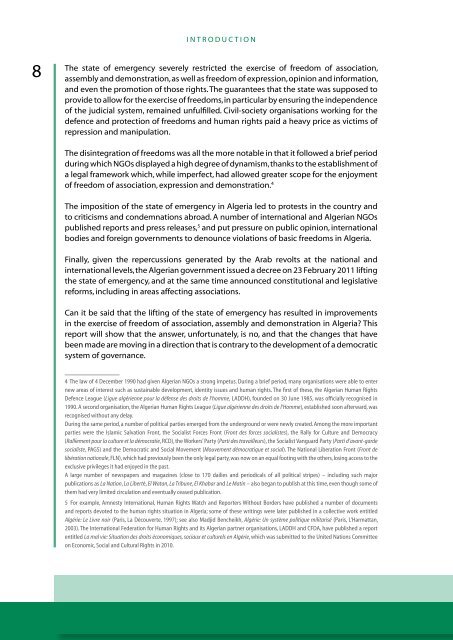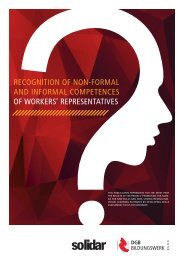Algeria - Solidar
Algeria - Solidar
Algeria - Solidar
Create successful ePaper yourself
Turn your PDF publications into a flip-book with our unique Google optimized e-Paper software.
I N T R O D U C T I O N<br />
8<br />
The state of emergency severely restricted the exercise of freedom of association,<br />
assembly and demonstration, as well as freedom of expression, opinion and information,<br />
and even the promotion of those rights. The guarantees that the state was supposed to<br />
provide to allow for the exercise of freedoms, in particular by ensuring the independence<br />
of the judicial system, remained unfulfilled. Civil-society organisations working for the<br />
defence and protection of freedoms and human rights paid a heavy price as victims of<br />
repression and manipulation.<br />
The disintegration of freedoms was all the more notable in that it followed a brief period<br />
during which NGOs displayed a high degree of dynamism, thanks to the establishment of<br />
a legal framework which, while imperfect, had allowed greater scope for the enjoyment<br />
of freedom of association, expression and demonstration. 4<br />
The imposition of the state of emergency in <strong>Algeria</strong> led to protests in the country and<br />
to criticisms and condemnations abroad. A number of international and <strong>Algeria</strong>n NGOs<br />
published reports and press releases, 5 and put pressure on public opinion, international<br />
bodies and foreign governments to denounce violations of basic freedoms in <strong>Algeria</strong>.<br />
Finally, given the repercussions generated by the Arab revolts at the national and<br />
international levels, the <strong>Algeria</strong>n government issued a decree on 23 February 2011 lifting<br />
the state of emergency, and at the same time announced constitutional and legislative<br />
reforms, including in areas affecting associations.<br />
Can it be said that the lifting of the state of emergency has resulted in improvements<br />
in the exercise of freedom of association, assembly and demonstration in <strong>Algeria</strong>? This<br />
report will show that the answer, unfortunately, is no, and that the changes that have<br />
been made are moving in a direction that is contrary to the development of a democratic<br />
system of governance.<br />
4 The law of 4 December 1990 had given <strong>Algeria</strong>n NGOs a strong impetus. During a brief period, many organisations were able to enter<br />
new areas of interest such as sustainable development, identity issues and human rights. The first of these, the <strong>Algeria</strong>n Human Rights<br />
Defence League (Ligue algérienne pour la défense des droits de l’homme, LADDH), founded on 30 June 1985, was officially recognised in<br />
1990. A second organisation, the <strong>Algeria</strong>n Human Rights League (Ligue algérienne des droits de l’Homme), established soon afterward, was<br />
recognised without any delay.<br />
During the same period, a number of political parties emerged from the underground or were newly created. Among the more important<br />
parties were the Islamic Salvation Front, the Socialist Forces Front (Front des forces socialistes), the Rally for Culture and Democracy<br />
(Ralliement pour la culture et la démocratie, RCD), the Workers’ Party (Parti des travailleurs), the Socialist Vanguard Party (Parti d’avant-garde<br />
socialiste, PAGS) and the Democratic and Social Movement (Mouvement démocratique et social). The National Liberation Front (Front de<br />
libération nationale, FLN), which had previously been the only legal party, was now on an equal footing with the others, losing access to the<br />
exclusive privileges it had enjoyed in the past.<br />
A large number of newspapers and magazines (close to 170 dailies and periodicals of all political stripes) – including such major<br />
publications as La Nation, La Liberté, El Watan, La Tribune, El Khabar and Le Matin – also began to publish at this time, even though some of<br />
them had very limited circulation and eventually ceased publication.<br />
5 For example, Amnesty International, Human Rights Watch and Reporters Without Borders have published a number of documents<br />
and reports devoted to the human rights situation in <strong>Algeria</strong>; some of these writings were later published in a collective work entitled<br />
Algérie: Le Livre noir (Paris, La Découverte, 1997); see also Madjid Bencheikh, Algérie: Un système politique militarisé (Paris, L’Harmattan,<br />
2003). The International Federation for Human Rights and its <strong>Algeria</strong>n partner organisations, LADDH and CFDA, have published a report<br />
entitled La mal vie: Situation des droits économiques, sociaux et culturels en Algérie, which was submitted to the United Nations Committee<br />
on Economic, Social and Cultural Rights in 2010.

















